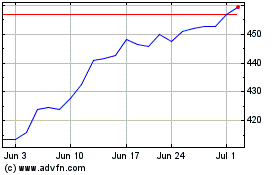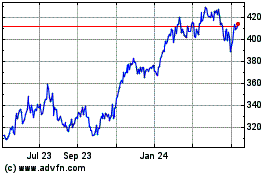Bidding From Salesforce Pushed Microsoft to Raise Its Offer for LinkedIn -- Update
July 01 2016 - 10:30PM
Dow Jones News
By Jay Greene
Persistent bidding from Salesforce.com Inc. forced Microsoft
Corp. to boost its offer for LinkedIn Corp. 22%, or roughly $5
billion, during the two months of negotiations, according to a
regulatory filing by the professional social network and a person
with knowledge of the matter.
The software giant ultimately agreed to buy LinkedIn last month
for $26.2 billion, or $196 a share in cash. That was a 50% premium
over LinkedIn's stock price before the deal's announcement.
A Securities and Exchange Commission filing by LinkedIn on
Friday disclosed that Microsoft submitted on May 4 a nonbinding
indication of interest to acquire LinkedIn at $160 a share in cash.
Nine days earlier, another company, described by LinkedIn as "Party
A," submitted its own nonbinding indication of interest to buy the
company for $160 to $165 a share in a mix of cash and stock.
The Wall Street Journal and other publications previously
reported Salesforce was the second bidder for LinkedIn. The person
familiar with the matter confirmed Salesforce is Party A.
The bid from Salesforce put pressure on Microsoft to boost its
offer several times. Even after LinkedIn entered an arrangement to
negotiate with Microsoft exclusively, Salesforce persisted on
pushing its bid. And as its stock price climbed, the value of its
offer grew as well, leading LinkedIn executives to press Microsoft
for more money.
LinkedIn also disclosed that a third company, which it described
only as "Party B," also entered into a confidentiality agreement to
consider buying the company after its brass met with LinkedIn Chief
Executive Jeff Weiner and LinkedIn controlling shareholder and
Chairman Reid Hoffman. As the first bids rolled in in early May,
Party B withdrew without making an offer, saying it was interested
only in teaming up with LinkedIn.
After Microsoft and Salesforce submitted their initial offers
May 6, LinkedIn notified the two companies that it would enter into
exclusive negotiations with either bidder if it raised its offer to
$200 a share. Neither company did so. That began a bidding war that
forced Microsoft to keep pace with Salesforce's steadily increasing
stock price, leading ultimately to Microsoft's generous winning
offer.
Three days later, Mr. Hoffman met with Bill Gates, Microsoft's
co-founder and a company director, in a previously scheduled
appointment. The pair discussed the "potential benefits to
Microsoft of potentially acquiring LinkedIn," according to the
filing. They also chatted about Mr. Hoffman's potential involvement
following an acquisition, "including, among other things, his
possibly serving on Microsoft's board of directors."
The same week, Salesforce revised its bid to $171 a share in
cash and stock, while Microsoft raised its offer to $172 a share in
cash. Both bidders said that they preferred not to participate in
an auction but wanted LinkedIn to give guidance to an acceptable
price.
On May 12, LinkedIn told both companies to submit "best and
final offers" by the following afternoon. Mr. Hoffman called
Microsoft Chief Executive Satya Nadella to say that he would
"personally support" a bid from Microsoft at $185 a share or more
if the LinkedIn board selected Microsoft as the winning bidder.
On May 13, Microsoft bid $182 a share in cash, but offered to
make a cash and stock offer if LinkedIn preferred. Salesforce
offered $182 a share as well, comprising $85 a share in cash and
the remainder in its stock. Both proposals requested that LinkedIn
negotiate on an exclusive basis.
Later that day, LinkedIn's board chose the Microsoft bid and, a
day later, entered into an exclusive agreement with the
company.
That didn't stop Salesforce, though. Over the following month,
as LinkedIn and Microsoft hammered out a deal, Salesforce submitted
revised proposals. The offers weren't dramatically different. But
Salesforce's climbing share price boosted the value of its overall
bid. Nonetheless, LinkedIn determined that it couldn't respond to
Salesforce's offer because of the exclusivity agreement.
On June 5, Salesforce tried one more time, increasing the number
of shares in its cash-and-stock bid, making for a total value of a
$200 a share. LinkedIn didn't respond. But the company told Mr.
Nadella on June 7 and again on June 8 that Microsoft's $182 a share
bid "was no longer supportable" and encouraged Microsoft to boost
its offer to $200 a share.
At that point, Mr. Nadella told Mr. Weiner that the companies
would need to discuss "cost synergies in the transaction" for
Microsoft to raise its bid. That led LinkedIn's chief financial
officer Steven Sordello to send Amy Hood, his counterpart at
Microsoft, "an analysis of potential cost synergies arising from
the combination," according to the filing. The filing didn't
disclose what those cost synergies are.
That was enough to convince Microsoft on June 10 to lift its
offer once again, this time to $190 a share in cash. Later that
day, Mr. Weiner told Mr. Nadella that the board would support a bid
for $196 a share in cash. On Saturday, June 11, Mr. Nadella agreed,
and the companies signed a deal. The companies announced the news
two days later before the stock market opened.
Write to Jay Greene at Jay.Greene@wsj.com
(END) Dow Jones Newswires
July 01, 2016 22:15 ET (02:15 GMT)
Copyright (c) 2016 Dow Jones & Company, Inc.
Microsoft (NASDAQ:MSFT)
Historical Stock Chart
From Mar 2024 to Apr 2024

Microsoft (NASDAQ:MSFT)
Historical Stock Chart
From Apr 2023 to Apr 2024
